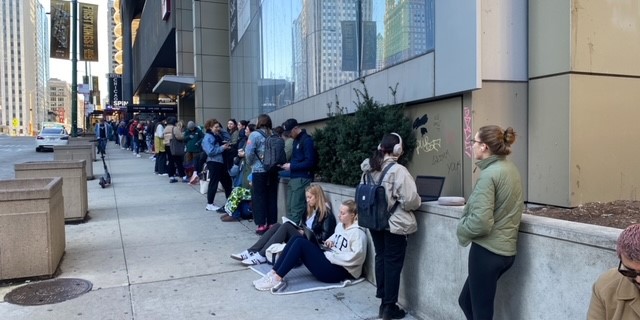Even if you've only been glancing at the newspaper every now and then in the last month, it's impossible not to notice that everyone is stepping into the group-buying ring . Facebook and Google are two of the latest to join the party and undoubtedly won't be the last (full disclosure, NBCChicago plans to enter the market this year).
Obviously Groupon's shadow looms largest right here in Chicago, but it's still a mighty-tempting business model. And the frequency with which these sites and services are popping up, it makes trying to be part of the conversation in the field seem that much easier.
That in mind, Inc. Well contacted daily-deal aggregator (and infrastructure provider for deal sites) Local Offer Network CEO Dan Hess to talk about what's involved with getting started.
After someone hatches the idea of starting a group-buying site, what are the next steps they should take?
Dan Hess: The first thing you need to do is take stock in your assets. One of the reason you see these huge companies (like Facebook and Google) getting into the fray is that it's a lucrative space. But also they have expansive assets they bring to the table that increase the odds of success. In particular they have brands with a tremendous audience and engagement. They've got access to enormous amounts of working media inventory to reach existing and new customers whether it's through the web or newspapers or TV stations. In many cases they also have existing relationships with businesses. These are all raw materials that increase the chances of success and certainly accelerate getting from zero to scale which is all important in scale.
One of the challenges that any of these businesses face is how to differentiate. In some cases the differentiation is simply the fact the website like a Facebook or a Google has access to such an enormous audience. A smaller company ideally will have some way to stand out from the pack. For example, here in Chicago we've had a number of nicely differentiated sites like Mamaloot. That was one of the first sites to be specifically targeted at moms and families and it was acquired recently by a bigger site called FamilyFinds.
Angie's List is another company that's managed to differentiate by requiring the businesses that run promotions have a minimum rating. Finally you've got companies like Chicago Tribune and MetroMix -- and for full disclosure, they run their deal products on our software platform -- but they bring established brands and sales forces to the table.
Local
What would you say would be the barebones sales force one would need for this sort of endeavor? Obviously they can't rival Facebook or Groupon right away. We've seen everything from one-person shops where you've got a single person doing it all from selling to running to the site all the way up to organizations that have several dozen sales people. Anything is possible. But number of sales people isn't always the be-all end-all. You can have one or two sales people who are deeply entrenched in a certain market such as restaurants or specific types of retail and they can be far more efficient and effective at winning deals with merchants than twice as many people who have no knowledge or relationships in that particular vertical market.
Is the clever copy necessary? The copy is extremely important. There's no question that the way the deal is crafted and articulated both in terms of copy, layout, image -- those things are all important because unlike most types of advertising you're trying to convince the consumer to put their money down upfront. So you need to accomplish a bunch of things. Certainly you need to provide confidence that this is a smart use of their money to the degree that they enjoy reading about it and develop a relationship with the deal site itself over time. That certainly helps at all.
But there are sites that have a very brief, matter-of-fact approach to copy and you've got the clever and irreverent. Certainly Groupon's approach has generated benefits to them but we've seen other styles and voices work for other sites as well.
The headlines are all declaring this is either a bubble or a smaller bubble within a bigger bubble that's about to burst.
Do you think it's a bubble that's going to burst -- and does it even matter?I don't think it will burst but I think it's a bubble that's going to look quite a bit different as time goes on. The model has already evolved considerably if you think about the characteristics of this business model as it existed originally. For example you had one great deal for one day in each market.
The concept of a "tipping point," which certainly was a big part of what drove the initial growth of the market is no longer considered a requirement because extremely popular deals tend to blow right past the tipping point very quickly. Those that aren't necessarily popular still deserve an opportunity to be bought. Ultimately over time we think that this will become a much more fluid and flexible type of promotion that local merchants can use to attract the volume that they need when they need it. In some cases that means that there will be five offers up for sale or 50,000. I don't expect it will burst but it will evolve into something that's much more efficient for everybody involved.
You talk about the process evolving. Reportedly Groupon plans deals out four months in advance. For newcomers, should they be thinking that far ahead or just try to be flexible even when starting out?
I think you'll find that even though you might have deals that are slotted for weeks or months out in advance, there's still some degree of flux in the picture. If a fantastic rare promotional opportunity arises that's very time-sensitive, then the smart organization will find a way to slot that deal. More often than not a merchant does not know when their deal is going to run. I'm sure there are exceptions to that, but it's very common for the merchant to have an approximate idea but not all the specifics. There are a lot of reasons why that happens. You need to allow for the fact that another deal becomes more appropriate to run in that slot. But typically the strongest sites do tend to have a pipeline of deals that stretches out for several weeks if not months at any given time.



